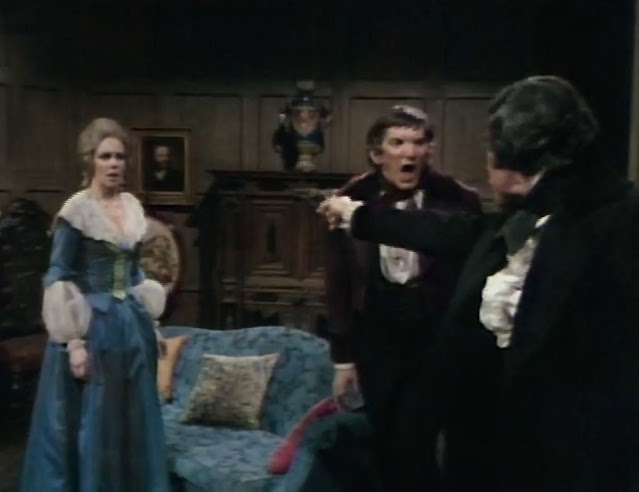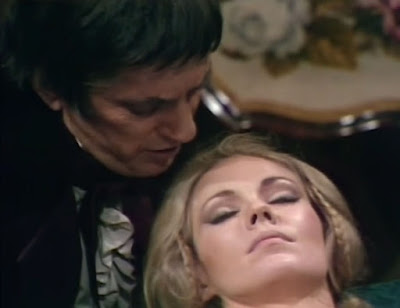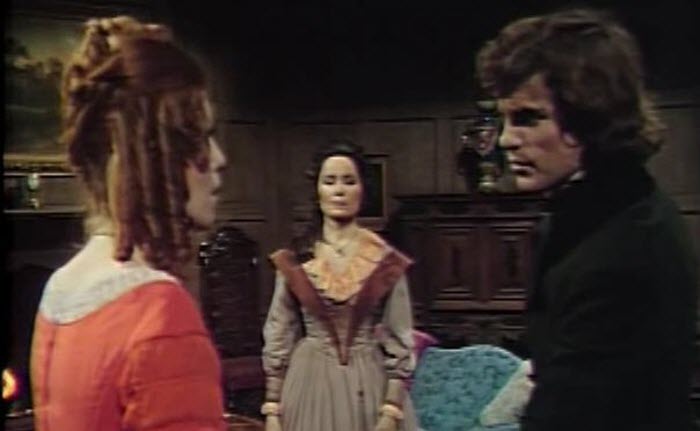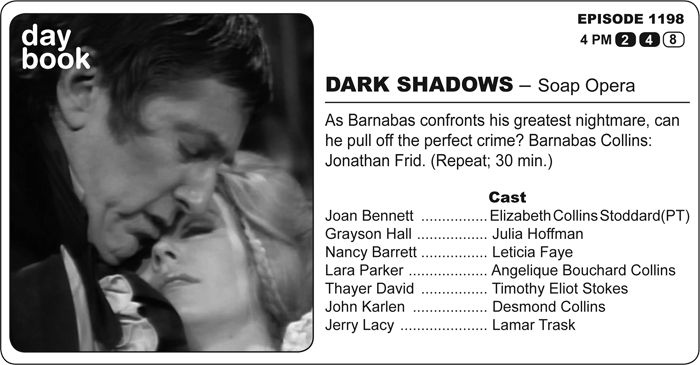Taped on this date in 1971: Episode 1198
By PATRICK McCRAY
As Barnabas embarks on a determined mission of cross-dimensional bloodlust, is he the victim of a larger trap? Barnabas Collins: Jonathan Frid. (Repeat; 30 min.)
Shot by Lamar Trask, Angelique dies in the arms of Barnabas, not hearing him proclaim his love. Savage in his response, Barnabas chases and stabs Trask, who finds himself trapped and dying in parallel time. Emotionally decimated, Barnabas returns to the present with Julia and Stokes to find that they have successfully altered the timeline for the better. Meanwhile, Letitia Faye and Desmond catch a brief glimpse of parallel time where Julia Collins discovers Trask’s body.
1198 is a dangerous episode. As the resolution of the primary series, it trolls fans as much as it fulfills their desires. There is no eleventh hour return of Kathryn Leigh Scott. There is no tearful reunion with Josette. Instead, Barnabas discovers happiness in the arms of a one-time enemy. As the program does what it can with what it has, it shocks more than satisfies. Seen now, it also divides viewers like few other decisions made over its run.
Do we see Barnabas discovering his authentic love for Angelique or merely convincing himself that the only game in town is what he always wanted? Is the series putting viewers in the same position? Are fans of the Barnabas/Angelique romance responding to something illuminating in the text or are they just making the best with what they have, convincing themselves it’s what they wanted all along? Are you on Team Angelique or Team Josette? It might depend on when you saw it.For millions of viewers over several decades, the climactic twist of Barnabas’ true, romantic direction is something they saw only once… or never saw at all. Without VHS, DVD or frequently cycled reruns, his “real” love is more of a rumor or fever dream than a fondly remembered highlight of the series. Until the mid-00’s, there was no way to review the moment, nor scour any of the series for clues. Good thing, because there were no clues. The writers were making it up as they went along, and if they had known that Barnabas’ true love was Angelique, they would have telegraphed it years before. Of course, the show might have benefited from this. But the fact that they can’t even hint at his unrealized love makes it more of a surprise.
And it makes the whole argument irrelevant. In 2021, Dark Shadows exists as a complete entity. The details of its authorship are just those: details. This is the reality of Barnabas Collins because it’s now part of a finished work.
The answer to the Josette vs Angelique question may not be so clear-cut as just choosing one over the other. I used to think of Angelique as the hero because of her 11th hour transformation and the tremendous sacrifices she makes along the way. But upon this viewing, I was struck by a possibility I had never considered before. As a director, something I always tell actors is that any character, at any point, may not be telling the truth. Even if the author makes it appear as if they are, they might not be. So, in terms of her grand transformation, what if Angelique is making it all up? Or some of it up. After all, she has always been perfectly happy to use her powers to influence Barnabas’ decisions. How he came about loving her was always less relevant than the fact that he simply did. No love spells (on him). She simply mastered the fine art of influence. First off… threats to family. That’s in 1795. Then, threats to him. That’s in 1968. In 1897, maybe jealousy over Quentin?
But at the end, none of those things worked, did they? Not like making yourself the hero against your past villainy, wiping out a larger threat, and then creating loyalty by curing your own curse. Has Barnabas been manipulated by a vast disinformation campaign? I say this because his decision is ultimately swayed by, yes, the involvement of witchcraft, years after her initial efforts. If it’s ineffective to use your occult powers, simply impress everyone by removing them. One way or the other, you’re still exploiting the occult. One way or the other, you would never be in the position you are if it were not for witchcraft. Clever. And strangely Zen.Take the implications to episodes that never happened. We have no evidence that she’s really given up her powers. It’s not like there’s a meter we can check. If she can suddenly cure a near-incurable curse, she can make her abilities appear and vanish at will. Faking her own death is the longest-but-strongest game possible. Had the 1971 Primary Time storyline happened, it might very well have seen Barnabas exploring the timeline in pursuit of Angelique. At last, she would be desired and sought on a level to rival Josette.
At last he would have her right where she wants him.
It’s just an interpretation. Just a what-if, True Believers. Yes, a bleakly cynical one of multilevel manipulation, but you have met Angelique, right?





